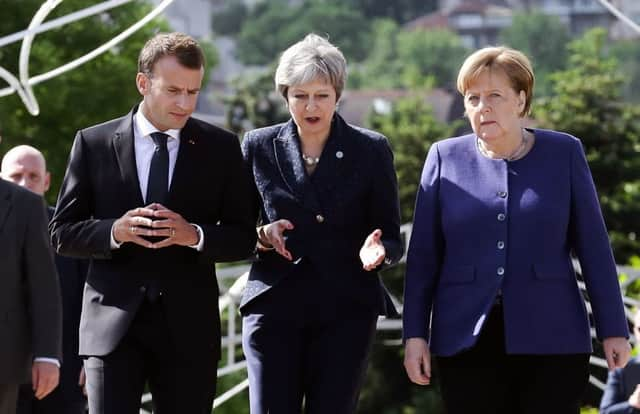Plan to stop hard border in Ireland as Theresa May denies delay to Brexit


The UK will draw up a new plan to avoid a hard border in Ireland after Brexit, Prime Minister Theresa May confirmed, amid growing speculation she could be forced to delay delivery of her pledge to leave the EU customs union.
Following meetings with the Taoiseach and European Union leaders at a summit in Bulgaria, Mrs May insisted the UK would leave the customs union as planned and would be free to sign its own trade deals in 2021, following the 21-month transition.
Advertisement
Hide AdAdvertisement
Hide AdHowever, she admitted that the UK would be drawing up a new “backstop” proposal to avoid a hard border between Northern Ireland and the Republic if the UK fails to strike a comprehensive trade deal with the EU that ensures goods continue to flow freely.
Reports yesterday suggested the new backstop would effectively keep the UK tied to the customs union beyond 2021, although this was denied by Downing Street.
Customs arrangements remain the biggest obstacle to agreeing the UK’s Brexit terms by an October deadline, with the Cabinet still divided over the government’s two proposed models, neither of which are acceptable to Brussels in their current form.
Number 10 sources insisted “there was not a proposal discussed or agreed that would see us staying in the customs union beyond the implementation period”, which is due to expire at the end of 2020.
Arriving at the EU Western Balkans summit in the Bulgarian capital, Sofia, Mrs May denied reports of a climbdown, but following talks with Leo Varadkar, European Council president Donald Tusk and European Commission president Jean-Claude Juncker, she confirmed that the UK’s alternative “backstop” proposal would be produced “in due course”.
Mrs May said: “The Commission published a fallback option which was not acceptable to us and we will be bringing forward our own proposal for that fallback option in due course.”
Controversy surrounds the existing “backstop”, which would require “alignment” on customs rules between Northern Ireland and the Republic, risking a border in the Irish Sea that has raised fears about a weakening of the Union.
Arriving at the Sofia summit, Mr Varadkar had warned: “If we are not making real and substantial progress by June then we need to seriously question whether we’re going to have a Withdrawal Agreement at all.”
Advertisement
Hide AdAdvertisement
Hide AdEurosceptics responded with dismay to the suggestion the UK could remain closely aligned to Brussels.
Tory backbencher Jacob Rees-Mogg, leader of the European Research Group, said: “The risk of the government using all its mental energy on the fallback position is that they create a position that is more attractive than a permanent deal.
“We have gone from a clear end point, to an extension, to a proposed further extension with no end point.”
But former cabinet minister Damian Green, who backed Remain in the referendum, said he was ready to accept a “small delay” to Brexit to ensure customs arrangements work effectively.
He said: “Surely the point about a new customs arrangement is that it needs to work smoothly from day one, or we will have chaos on the roads, especially in Kent.”